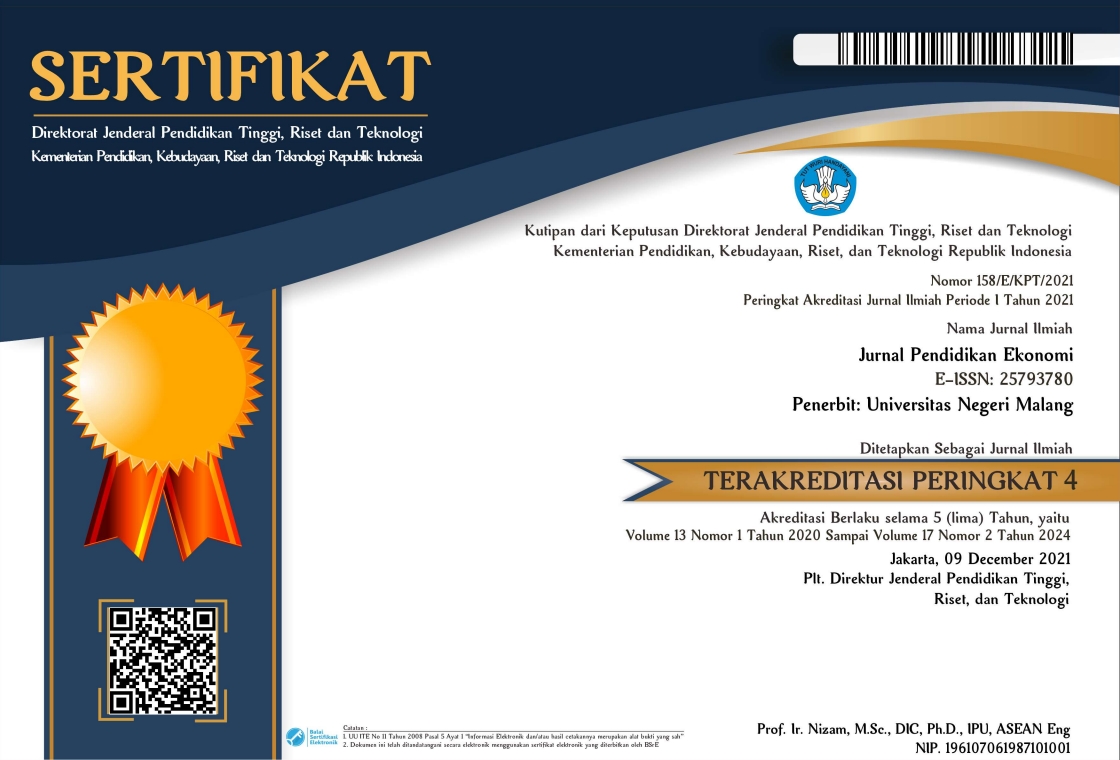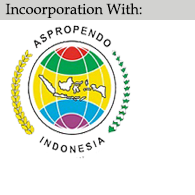Peningkatan Kemandirian Belajar Mahasiswa di Masa Pandemi Covid-19 melalui Penerapan Blended learning pada Mata Kuliah Evaluasi Proses dan Hasil Belajar di Universitas Negeri Malang
Abstract
Because of the Covid-19 pandemic, learning was carried out online (online). With online learning, students are required to be independent and learn. Increasing independent learning can be done using Blended Learning. This learning concept is learning designed by combining offline and online learning. The method used in this research is descriptive qualitative by providing an open survey to respondents who are participants of the course. From the results obtained, the learning independence possessed by students in the Process Evaluation and Learning Outcomes course is very high.
Keywords
Full Text:
PDFReferences
Amadania, F (2020) Blended Learning dalam Merdeka Belajar Teks Eksposisi. STILOSTIKA, Volume 5 (1), 10-21
Achdiani, A.Y (2015) Penerapan Self Regulated Learning Berbasis Internet untuk Meningkatkan Kemandirian Belajar Mahasiswa. INVOTEC, Volume XI(1), 15 – 22
Askar, M.W, Permana, M.Y., Hidayah, I et al (2020). Maju Mundur PSBB: Perketat atau Longgarkan?. Covid-19. Scientific Update 01/2020
Dabbagh, N. (2007). The online learner: Characteristics and pedagogical implications. Contemporary Issues in Technology and Teacher Education, 7(3), 217-226.
Darmalaksana, Wahyudin, et al. (2020). Analisis Pembelajaran Online Masa WFH Pandemic Covid-19 sebagai Tantangan Pemimpin Digitasl Abad 21
Enrico, A., Aron, R., & Oktavia, W. (2014). The Factors That Influenced Consumptive Behavior. A Survey of University Students in Jakarta. International Journal of Scientific and Research Publications, 4(1), 1-6.
Gambari, et.al. (2017) Effectiveness of Blended Learning and ELearning Modes of Instruction on The Performance of Undergraduates in Kwara State, Nigeria. Malaysian Online Journal of Educational Sciences, 5(1), 25-36.
Husamah (2014) Pembelajaran Bauran (Blended Learning). Prestasi Pusaka
Irvin R. K & Alexius S. M (2017) Information and Communication Technology (ICT) Literacy: Integration and Assessment in Higher Education. Systemics, Cybernetics And Informatics Volume 5 - Number 4
Merrow, J. (2012) Blended Learning, But To What End? [Retrieved from http://takingnote.leamingmatters.tv/?p=5908]
Pattah, S. (2014) Literasi Informasi Peningkatan Komptensi Informasi dalam Proses Pembelajaran. Jurnal Ilmu Perpustakaan dan Kearsipan Khizana Al Hikmah, Vol. 2(2), 117-128
Ramadania, F (2020). Blended Learning Dalam Merdeka Belajar Teks Eksposisi. Stilistika: Jurnal Bahasa, Sastra, dan Pengajaranya, Vol.5 No.1, April 2020, 10-21
Rizqi, A. A. (2016). Kemampuan Komunikasi Matematis Siswa melalui Blended Learning Berbasis Pemecahan Masalah. PRISMA, Prosiding Seminar Nasional Matematika, 191-202. [On line, https://journal.unnes.ac.id/sju/index.php/prisma/article/view/21457
Ruhana D, Setyoko (2017) Analisis Aktifitas dan Kemampuan Literasi TIK Mahasiswa Pendidikan Biologi terhadap Pengembangan Model Pembelajaran Blended Learning Berbasis Web. Prosiding Seminar Nasional III dan Pembelajaranya Universitas Negeri Medan, 08 September 2017. ISBN: 978-602-5097-61-4.
Sari, RA (2013) Strategi Blended Learning Untuk Peningkatan Kemandirian Belajar dan Kemampuan Critical Thinking Mahasiswa Era Digital. Jurnal Pendidikan Akuntansi Indonesia, Vol. XI, No.2
Susilawati, D (2009) Upaya Meningkatkan Kemandirian Belajar dan Kemampuan Matematika Siswa Kelas X SMA N 1 Gamping dengan Menggunakan Lembar Kerja Siswa. Skripsi. Yogyakarta. UNY (Tidak Dipublikasikan)
Syarif. (2012) Pengaruh Model Blended Learning terhadap Motivasi dan Prestasi Belajar Siswa SMK. Jurnal Pendidikan Vokasi. Vol 2, Nomor 2, 2 Juni 20120.
Watson, J., (2008) Blended Learning: Convergence between Online and Face-to-Face Education. USA: North American Council for Online Learning.
Yuliati, Y. et.al. (2020). Membangun Kemandirian Belajar Mahasiswa melalui Blended Learning di Masa Pandemi Covid-19. Jurnal Elementaria Edukasia. Vol3, No 1. pp 142-149
Refbacks
- There are currently no refbacks.

Jurnal Penddidikan Ekonomi is licensed under a Creative Commons Attribution-NonCommercial-ShareAlike 4.0 International License





